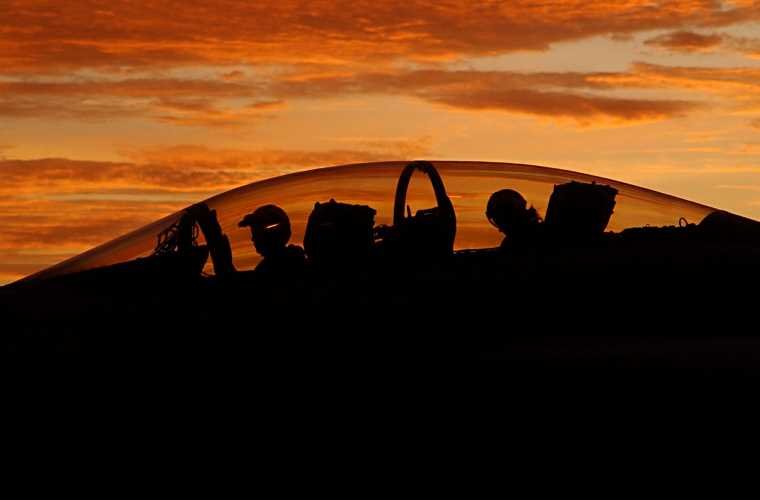Physical changes in the brain of fighter pilots caused by the extreme forces and unique tactical situations they encounter may mirror those experienced by astronauts, including increased and decreased connectivity in certain brain regions. The sheer number of current and former fighter pilots versus the small number of those who have actually been to outer space can provide a deep pool of test subjects for scientists trying to prepare future astronauts for the brain changes they are sure to experience on long journeys to distant planets.
Similar Neuroplasticity Among Astronauts and Fighter Pilots
Dubbed neuroplasticity, physical and chemical changes to the brains of fighter pilots seem to be caused by the extreme g-forces and massive amounts of sensory input data they experience. That data is often conflicting and coming at an extremely rapid pace, requiring fighter pilots to make critical decisions at high speeds and under extreme physical duress.
Previous research has shown that astronauts undergo some of these same brain changes due to the extreme g-forces experienced during launch, the virtually zero-g environments of space, and the same combination of high data input and time-critical decisions placed on space travelers. Unfortunately, studying astronauts and the neuroplasticity changes to their brains is limited by the tiny set of people who have actually flown to space. However, there is a much larger population of current and former fighter pilots, offering researchers the opportunity to study their brains in hopes of better-preparing astronauts of the future.
Now, a team of researchers from the University of Antwerp is taking advantage of the similarities in brain neuroplasticity between fighter pilots by mapping some of those changes associated with the extreme yet similar aspects of their unique jobs. And their results are shedding light on which areas of the fighter pilot’s brain are most affected by extreme g-forces and massive data input and analysis, and how those effects can be enhanced or mitigated.
The Fighter Pilot brain Adapts to Extreme G’s and Massive Amounts of Data
“Fighter pilots have some interesting similarities with astronauts, such as exposure to altered g-levels, and the need to interpret visual information and information coming from head movements and acceleration (vestibular information),” explained Professor Floris Wuyts of the University of Antwerp and senior author on the study. “By establishing the specific brain connectivity characteristics of fighter pilots, we can gain more insight into the condition of astronauts after spaceflight.”
To better understand these brain changes, the research team recruited 10 former F-16 fighter pilots from the Belgian Air Force, and then supplemented their study group with 10 non-pilots. Both groups were in otherwise good health and had no history of brain ailments or injury.
Next, Wuyts’ team subjected each of the participants to a range of MRI brain scans. These detailed scans allowed the researchers to study the level of connectivity in individual areas of the brain, particularly those associated with sensing and adjusting to acceleration, known as vestibular motion, and the areas of the brain that evaluates and interprets visual inputs. Conductivity in these and other regions affected by the extremes of spaceflight is often a large component of the brain changes that astronauts experience, so the researchers postulated that a similar exposure to extreme g-forces and data overload experienced by fighter pilots might result in similar changes to those same areas of the brain.
As expected, a detailed analysis of the brain scans of all 20 participants revealed a number of differences between the pilots and non-pilots, and which were similar to those of astronauts. These changes mainly showed up in two key brain regions.
According to the published research, which appears in the journal Frontiers of Physiology, these changes included less connectivity in areas of the brain processing sensorimotor information, a finding that the research team concluded, “may indicate the brain adapting to cope with the extreme conditions experienced during flight.”
Conversely, the researchers found that the areas of the brain involved in processing vestibular (balance) and visual information were more connected in pilots than in the group of non-pilots, another finding similar to brain scans of astronauts.
“This may reflect the requirements for pilots to cope with processing multiple and occasionally conflicting visual and vestibular stimuli at once and to prioritize the most important stimuli, such as reading cockpit instruments,” the researchers explain.
They also found a range of differences between the more experienced and less experienced pilots, with the more experienced pilots’ brains showing significantly more altered connections in key brain regions than the less experienced ones. Although the study group was small, the team believes this result seems to suggest that changes to pilots’ brains increase with more flight hours.
Preparing Future Space Travelers for the Rigors of Space Flight
The Antwerp team says their goal in studying the brain changes in fighter pilots caused by the extreme-g forces and sometimes conflicting data they experience was always designed to offer insights they could use to prepare future astronauts and space travelers for the rigors they are most surely going to face on month-long or even years-long journeys to other planets.
“By demonstrating that vestibular and visual information is processed differently in pilots compared to non-pilots, we can recommend that pilots are a suitable study group to gain more insight into the brain’s adaptations toward unusual gravitational environments, such as during spaceflight,” explained Dr. Wilhelmina Radstake, the first author on the study and the primary researcher who conducted a Master’s thesis on this topic in Professor Wuyt’s lab.
Christopher Plain is a novelist, comedian, and Head Science Writer at The Debrief. Follow and connect with him on Twitter, learn about his books at plainfiction.com, or email him directly at christopher@thedebrief.org.

